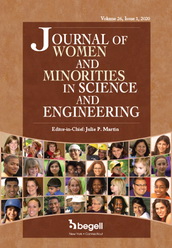
Publicou 6 edições por ano
ISSN Imprimir: 1072-8325
ISSN On-line: 1940-431X
Indexed in
MAKING WOMEN AND MINORITIES IN SCIENCE AND ENGINEERING FOR NATIONAL PURPOSES IN THE UNITED STATES
 Get access
Get access
RESUMO
This is a cultural history of the creation of women and minorities in science and engineering as a statistical category in the United States. The main thesis is that narratives about the nation, its problems, and its solutions, shape policies and programs for the education and training of scientists and engineers, as well as the meaning of the category women and minorities in science and engineering. This cultural relationship among nation, policy, and statistical categories has been evident in the development of programs for education and human resources at the National Science Foundation (NSF). Power struggles and social negotiations surrounding NSF programs define national solutions in terms of scientists and engineers, and create the category women and minorities in science and engineering. During the last 3 decades different groups have used a variety of strategies in their attempts to participate in the policy-making processes that determine both their access to science and engineering education and their acceptance as scientists and engineers. This is a brief history, from the 1970s to the present, of how these struggles resulted in programs at the NSF to recruit, educate, and retain women and minorities in science and engineering in appropriate ways, where what is appropriate changes over time. This cultural and historical process is called making women and minorities in science and engineering for national purposes.
-
Wyer Mary, Murphy-Medley Deena, Damschen Ellen I., Rosenfeld Kristen M., Wentworth Thomas R., No Quick Fixes: Adding Content about Women to Ecology Course Materials, Psychology of Women Quarterly, 31, 1, 2007. Crossref
-
O’Connor Kevin, Peck Frederick A., Cafarella Julie, Struggling for Legitimacy: Trajectories of Membership and Naturalization in the Sorting Out of Engineering Students, Mind, Culture, and Activity, 22, 2, 2015. Crossref
-
Lucena Juan C., Flexible Engineers: History, Challenges, and Opportunities for Engineering Education, Bulletin of Science, Technology & Society, 23, 6, 2003. Crossref
-
Weststar Johanna, Legault Marie-Josée, Women’s Experiences on the Path to a Career in Game Development, in Feminism in Play, 2018. Crossref
-
Secules Stephen, Making the Familiar Strange: An Ethnographic Scholarship of Integration Contextualizing Engineering Educational Culture as Masculine and Competitive, Engineering Studies, 11, 3, 2019. Crossref
-
Lucena Juan, Downey Gary, Jesiek Brent, Elber Sharon, Competencies Beyond Countries: The Re-Organization of Engineering Education in the United States, Europe, and Latin America, Journal of Engineering Education, 97, 4, 2008. Crossref
-
Jesiek Brent K., Newswander Lynita K., Borrego Maura, Engineering Education Research: Discipline, Community, or Field?, Journal of Engineering Education, 98, 1, 2009. Crossref
-
Secules Stephen, Sochacka Nicola W., Huff James L., Walther Joachim, The social construction of professional shame for undergraduate engineering students, Journal of Engineering Education, 110, 4, 2021. Crossref
-
Lucena Juan, What is Engineering for? A Search for Engineering beyond Militarism and Free-markets, in What is Global Engineering Education For?, 2011. Crossref
-
Riley Donna, Slaton Amy E., Pawley Alice L., Social Justice and Inclusion, in Cambridge Handbook of Engineering Education Research, 2014. Crossref
-
Nardo Jocelyn Elizabeth, Case for Narrative Inquiry: Understanding the Experiences of Elena, A Historically Minoritized Graduate Student in Chemistry, Journal of Chemical Education, 99, 1, 2022. Crossref
-
Jenkins Eric, Nardo Jocelyn Elizabeth, Salehi Shima, Al-Yateem Nabeel, A systematic review of the 60 year literature: Effects of outreach programs in supporting historically marginalized and first-generation, low-income students in healthcare education, PLOS ONE, 17, 12, 2022. Crossref